Welcome back to Moldova Matters. This week we’re continuing our new format called “Quick Hits” where we will write important updates on evolving stories during the week. For now, we’ll use this format to keep more regular updates moving on the Russia - Ukraine crisis and specifically how this impacts Moldova.
Quick Updates on Refugee Crisis:
Last week we wrote about the Refugee Crisis in Moldova and the near total absence of the large relief organizations. After sending this update I have had *many* meetings and calls with aid groups. Unfortunately, the bottom line remains the same - almost none are actually operating here. I will write more about this soon with greater detail.
Following from this last point, the grassroots response remains absolutely critical. We are opening a second distribution center in Balti Moldova with support from the Friends of Moldova NGO. Please consider donating as the cavalry seems far off indeed.
Progress of the War
Much of the reporting of the last week has focused on the war entering a new phase. Russian troops claim to be pulling back from Kyiv of their own accord but are most likely beginning a retreat due to heavy losses. Overall the conflict appears to be entering a “war of attrition” phase as Russia regroups and concentrates forces in the east. At the same time, attacks on Kyiv and cities across Ukraine continue. In Mykolaiv a Russian strike destroyed the regional administration building. The regional governor, Vitaliy Kim, who like Zelensky has become a hero of resistance for his cool composure under fire, survived because he slept in. Governor Kim stated that these strikes against his office are likely a recognition by the Russians that they cannot take the strategic southern city and therefore will have to shift to attempting to destroy it.

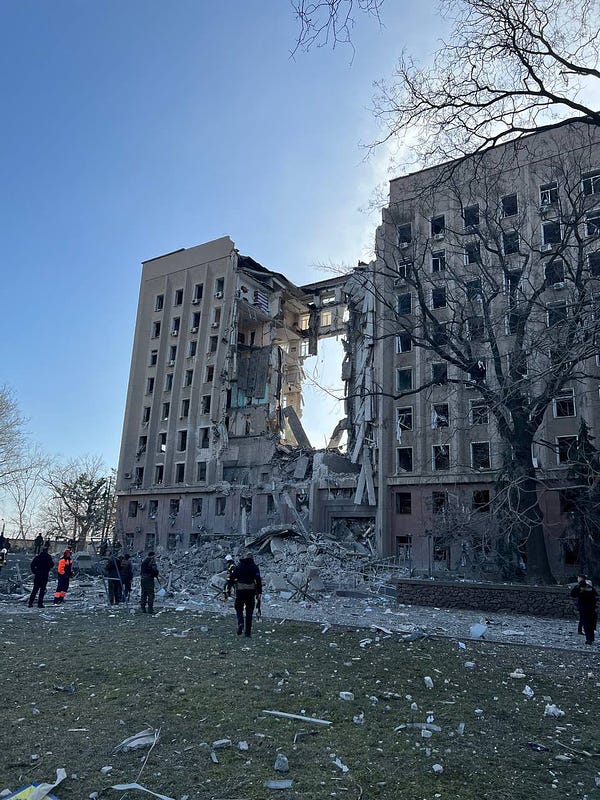
Odessa
Most critical for Moldovan security, the city of Odessa remains safe, as the resistance in Mykolaiv and counterattacks in Kherson drive Russian troops further from the southern port city. At the same time, the city continues to prepare for war. This week it was announced that billboards across Odessa and the surrounding highways are being taken down and turned into hedgehogs and barricades. Road signs across Ukraine are also being removed in order to confuse invading forces.
Tragically, 2 people drove a private vehicle onto a mined beach in Odessa ignoring the warning signs. Their car was blown up and one person died. Colonel Vladislav Nazarov officer of the operational command "South" warned residents of the following:
“The coast of the Black Sea is not a place of rest, but a probable springboard for the landing of enemy troops. Don't put yourself in danger,"
This is incredibly tragic to read for anyone who has enjoyed summer holidays on Odessa’s sandy beaches.
While preparations to defend the city continue, many experts believe that the immediate danger has passed. Retired US General and former commander of the United States Army Europe, Ben Hodges said the following this week:
“It is unlikely that Russian troops will reach Odessa, which means they are unlikely to try to invade Moldova. Yes, the Russians have soldiers in Transnistria, about 2,000. But I don't think they will be able to use them. I suspect that such plans were in the early days of the war, but now it is almost impossible, ”
International Press in Moldova
One surreal aspect of this terrible war has been just how many people suddenly found Moldova on the map. We’re going to add a short section highlighting international stories and video reporting (in English) from reporters on the ground in Moldova.
NYTimes Video Report on Refugees in Moldova. Simon Ostrovsky is a fantastic video journalist who previously covered the Maidan revolution through the first years of the 2014 - 2015 war in Ukraine for vice news. His report in Moldova highlights the refugee crisis.
PBS Newshour on the Refugee Crisis - I actually make an appearance in this one. PBS does a great roundup of the situation in Moldova and shows many aspects of the crisis and response.
The Guardian “the poor help the desperate” - I can’t say I like the title, but the article is a great roundup with local experts of the situation in Moldova.
EuroNews “Moldova Holds its Breath” - The article is in Russian, but the video in English. This interview with John and Aliona Maxemchuk who are both moving mountains to respond to the refugee crisis themselves goes into the precarious geopolitical and security situation Moldova finds itself in.
RTE on Moldova’s situation - A great interview with local experts on Moldova’s precarious position.
Moldova Under Threat
It is fair to say that the immediacy of the threat against Moldova has faded somewhat. Summarizing the situation in Odessa President Zelinsky’s advisor Aleksey Arestovich said the following this week:
“Odessa is almost completely safe. At most, she is threatened with attempts by artillery shelling from ships that ended badly. Or some kind of air raids that ended even worse for the Russian side. Until Nikolaev is taken, Odessa has nothing to fear. And Nikolaev was not only not taken, they moved away from him. And [Russian troops] are barely holding the line,”
He also noted that any attack from Transnistria is increasingly unlikely. At best the breakaway region could call up 15,000 poorly equipped troops (local conscripts + Russian army) and the Ukrainian President’s advisor was confident that this force would be rapidly dispatched by Ukrainian troops if they moved before Russian troops linked up from the east.
At the same time, President Maia Sandu summarized the larger strategic picture well in the following quote.
“The danger has not passed. There will be no danger when peace is restored. It is clear that Moldova borders on Ukraine, where there is a war and the risk is great. But now there is no information that would tell us that the Russian Federation is going to conduct military operations in Moldova,”
At the same time, people continue to worry and prepare. Journalists in Moldova have managed to secure limited sets of bulletproof vests and combat helmets.

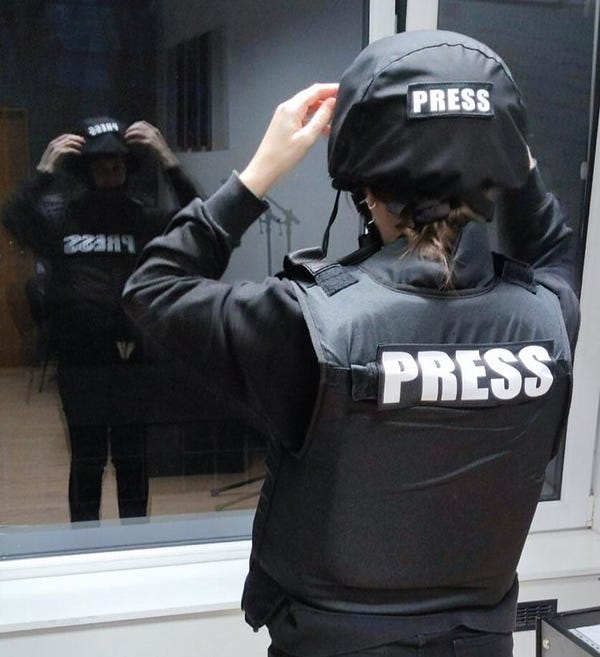
Meanwhile, the Socialist and Communist parties in Moldova have formulated their own approach to the crisis. This week, they proposed a bill to further codify Moldova’s “neutral” status. Nevermind that neutrality is already written into the constitution. The bill goes further though and stipulates a “demilitarization” of Moldova which would prevent Moldovan troops from taking part in exercises or peacekeeping missions abroad. Further, no foreign troops would be allowed on the territory of Moldova for any reason including training. Naturally, this bill does not apply to the Russian army which illegally occupies Transnistria already. The Socialists considered this a “separate issue.” The bill is a non-starter and will go nowhere. But it’s worth noting that the Socialist Party, which has for years torpedoed attempts at diversifying energy supplies and the creation of economic links with the EU now wants to make sure that the Moldovan army can’t get training from the west while allowing the Russian army to occupy Moldovan territory. It seems rather clear what their intentions are.
Moldovan Volunteers Fighting in Ukraine
Some Moldovans have answered the call of President Zelensky to come and fight in Ukraine. They say that they are fighting for their home by fighting for Ukraine. A group that joined the international brigade had this to say to journalists:
“From the very beginning of the war, we, a group of Moldovans, understood that the war in Ukraine would not stop there. Perhaps it will reach Moldova or even further. Judging by what the Americans, the British and others say, Russian plans are very big. Their plans include the Baltic countries, Ukraine, Moldova and possibly even Romania. I understand that this will not end only with Ukraine. We have children, grandchildren and so on in Moldova, so we decided to form a group to go and support the Ukrainians and fight alongside them so that Russian forces here in Ukraine don't get to us in Moldova. We have Transnistria, where there is a lot of equipment - tanks, armored vehicles, etc., which are not in Moldova - plus the Russian army. In other words, the Transnistrian army is much better equipped and more powerful than the Moldovan one,”
Economic News
The economic fallout from the war for Moldova has not properly been covered in either local or foreign press to date. In large part this is because it has taken time to grapple with the massive reorientation of trade and supply chains that is going on. Now, in a first major study, the UNDP estimates that up to 30% of Moldovans will fall into poverty this year as a result of the war. They say that if the war continues into a 2nd year this number could hit 50%. These estimates are based on supply chain disruptions, increasing prices and import / export links to both Russia and Ukraine.
In a rare bit of good news, the EU has agreed on a joint purchasing program for natural gas, LNG and hydrogen. Moldova will be included in this plan which is a huge step forward in EU solidarity and market power. Explaining the program EU diplomats said the following:
“In doing so, it is necessary to use the collective political and market weight of the European Union and its member states to lower prices during negotiations. Joint purchases of energy resources will also be available for the countries of the Western Balkans and the three associate members of the Eastern Partnership [Moldova, Ukraine, Georgia],”
This will allow the EU to negotiate for gas and not leave Moldova trying to fend for itself against Russia.
Refugee Crisis
Over a month into this war institutional relief agencies (UN, USAID, etc) still have almost no presence in Moldova and have brought neither material aid nor financial resources to support refugees. At the same time, UNICEF Goodwill Ambassador Orlando Bloom came to Moldova this week to highlight the efforts of UNICEF supporting refugee children. It is no exaggeration to say that the money spent on his hotel room exceeded the total spending on actual support to refugee children.

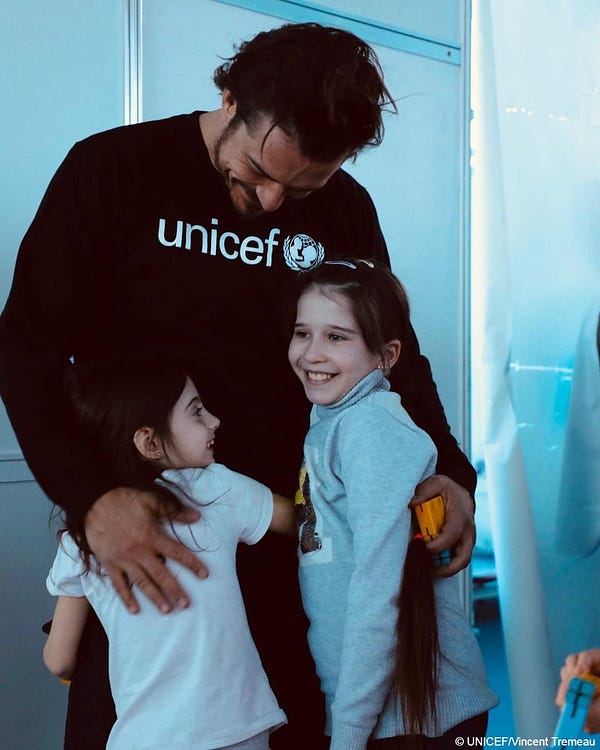
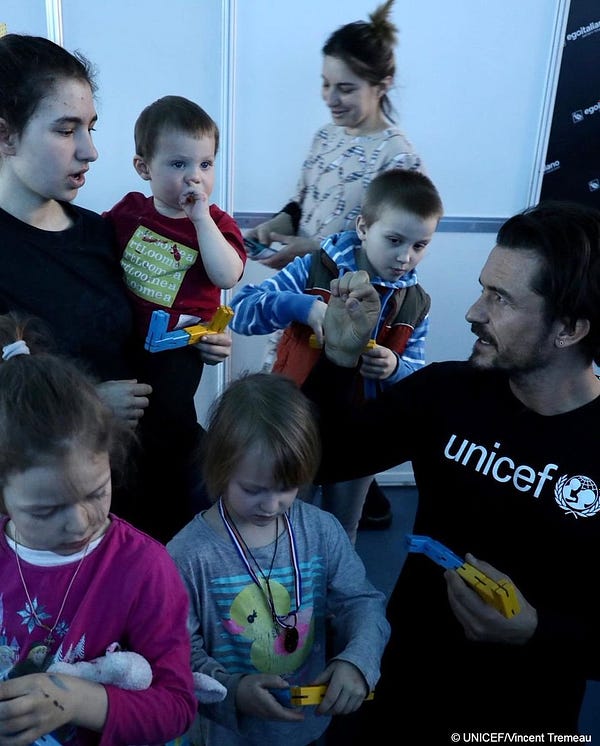
It is important to stress that I do not write that as an attack on Orlando Bloom. It is fantastic that he came to Moldova and helped direct the world’s attention to the humanitarian crisis here. Nor is it meant as an attack on UNICEF which is a fantastic organization that does amazing work. At the same time, it is critical to highlight the *massive* gap between the PR campaign by these agencies and the actual impact they are not having on the ground. While Orlando Bloom was staying at his hotel, down the road volunteers at Smokehouse were assembling strollers, giving out baby formula and providing truckloads of diapers on a daily basis to new mothers who all say that they have literally no where else to go for help.
One UN program that got rolling this week was the direct financial aid to refugees in the form of pre-paid debit cards. This program launched Monday and will provide each refugee with $120 / month and one time payments to Moldovan host families of $190. This is wonderful but the rollout is not expected to be fast. In the early stages only around 1,000 cards are expected to be issued a day and people registering now are given appointments 2-3 weeks away to get their assistance. Given the flow of over 2,000 refugees a day into Moldova we can do some napkin math and see that much more is needed (note: many refugees transit so 2000 do not stay here every day). Hopefully as this program ramps up in the coming weeks we will see a first sign of real systemic support in Moldova.
**Update - the original version of this article incorrectly stated the cash assistance numbers in euros. They have been updated to reflect the fact that these numbers are in dollars.
Meanwhile, donations and material aid are starting to arrive from other sources. The supermarket chain Kaufland donated food and personal hygine products worth 2 million lei this week. There was also a major shipment of material aid from the WHO and the EU worth 804,000 euro. This includes medicines as well as food aid for the government distribution system. Hopefully we will be able to write in a week’s time that the cavalry has arrived. Unfortunately, based on conversations with people inside many of these groups the continuing failures of organization and coordination leave me highly skeptical this will be so.
International Diplomacy
On the international front there were major public statements from Moldova’s 2 most important partners - Romania and Ukraine. Romanian President Iohanis said in an interview that Romania doesn’t see any direct military threat to Moldova but went so far as to call Moldova a "captured state" referring to Russia’s energy hegemony.
Meanwhile, Mikhail Podolyak to the President of Ukraine spoke about their cooperation with Moldova saying the following:
“Moldova supports us in all directions, Moldova has taken a clear position in the conflict between the Russian Federation and Ukraine. For us, this is all very important. We understand that Moldova cannot, like France or Germany, provide full resource assistance, […]
"Moldova met all the expectations of Ukraine."
Additionally President Maia Sandu held her first phone call with President Zelenski since the start of the war. In this call they discussed Moldova’s work supporting refugees. No other information about the call was provided.
Information War
Right now, it is fair to say that Moldova is a frontline in the information war being waged by Russia but also by other actors over the war in Ukraine. The Moldovan government has worked hard since the first days of the war to assure that Moldovan society is resilient to fake news and false messaging. At the same time, they have been unwilling to cross the Russian Federation by outright blocking Russian propaganda channels. The Chairman of the Council of Television and Radio Liliana Vicu believes this should change. She has called for new restrictions that would block Russian TV during the State of Emergency and only allow broadcasting from countries that have signed the European Convention on Transfrontier Television (which Russia has not). Moldova previously had such restrictions and she believes they must be re-introduced saying:
“A return to these amendments is absolutely necessary. The war in Ukraine showed that our condition is very fragile. We are very vulnerable to outside propaganda,”
At the same time, state authorities are investigating specific instances of organized groups calling for support for Russia. The fringe “Patriots of Moldova” party along with the organization "Our Motherland - Moldova" recently held a press conference where they tied the St. George’s ribbon to their microphones and expressed open support for Russia in the war. The Prosecutor's Office for Combating Organized Crime and Special Cases is investigating.
Transnistria is also experiencing a sort of information warfare with bomb threats being made against schools and kindergartens in the region with such frequency that many towns have moved to online school. No demands are being made other than emails calling for the end of the Russian occupation of the region. Recall, in the months prior to the war both Moldova and Ukraine were experiencing a massive wave of bomb threats against malls, schools and government buildings that appear to have been the work of teenagers across Europe and Russia coordinating in telegram groups.
This past week, more protests were held in front of the Russian Embassy in Chisinau. In one case a group hung Putin in effigy.
This led to strong complaints from Russia and the summoning of the Moldovan ambassador in Moscow so that the Kremlin could lodge a formal protest. Moldovan authorities responded by noting that the Moldovan constitution enshrines free speech and the right to peacefully organize.
Thank you for reading this update from Moldova Matters. If you haven’t already, consider becoming a paid subscriber. During the war all updates will continue to be open to all whether paying or not. But each subscription helps us expand Moldova Matters and bring more and more quality information right to your inbox. It’s just $5 / month and helps let the world know that Moldova Matters.




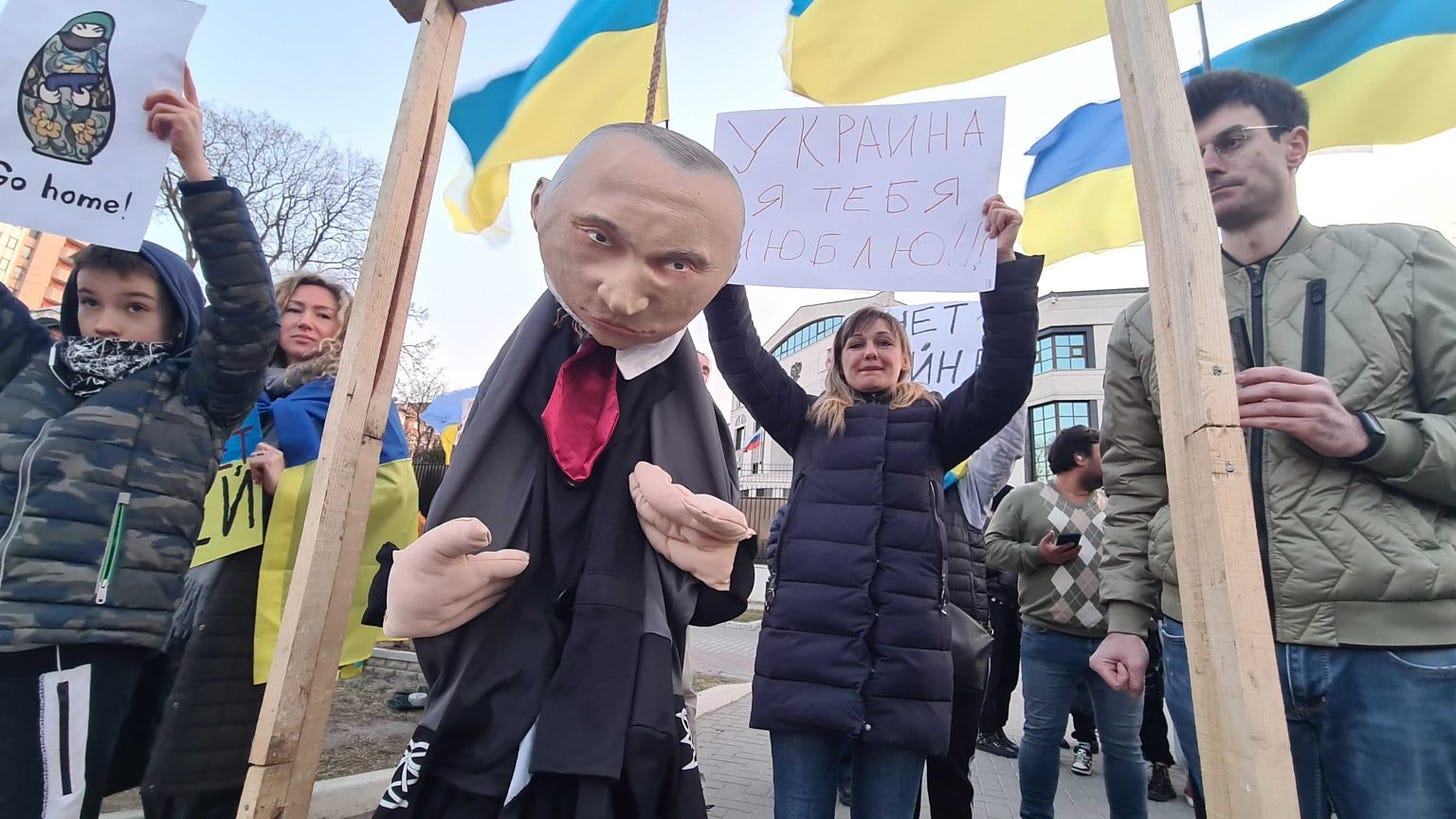
I am with The Salvation Army in Eastern Europe. The Salvation Army is active supporting Ukrainian refugees in many towns across Moldova including Chisinau. They are providing accommodation, food, personal items etc. If you contact Major Andrei Iniutochkin on +37376704016 I am sure we can help. He speaks good English. Tell him I told you to call.